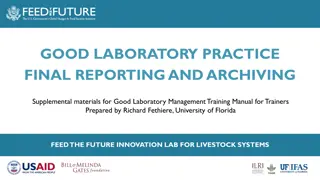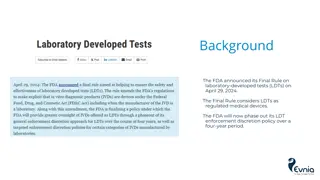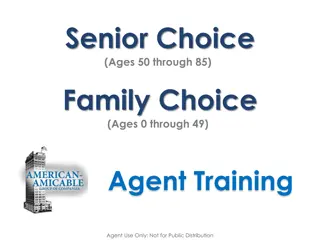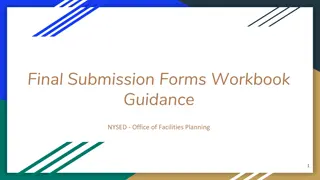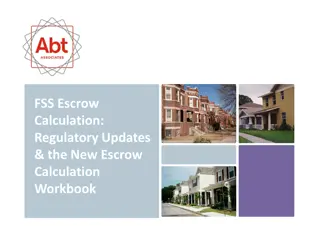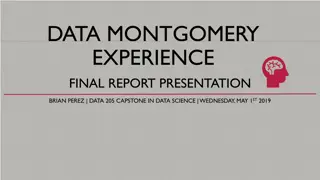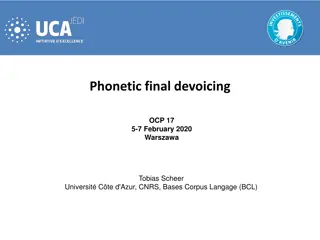Compliance and Provider Duties in Human Rights Regulations
The content discusses the duties of providers in delivering services to individuals according to the law and therapeutic practices. Providers must ensure non-discrimination, emergency preparedness, tailored individual service plans, and accurate service records. Section 60 outlines specific provider responsibilities regarding services provided to individuals, emphasizing the need for individualized service plans and discharge plans.
Download Presentation

Please find below an Image/Link to download the presentation.
The content on the website is provided AS IS for your information and personal use only. It may not be sold, licensed, or shared on other websites without obtaining consent from the author. Download presentation by click this link. If you encounter any issues during the download, it is possible that the publisher has removed the file from their server.
E N D
Presentation Transcript
Human Rights Regulations Unit 2: Explanation of Individual Rights and Provider Duties Topics 2-4: Review Sections 60-130 Office of Compliance and Risk Management 2021
CSB Mission, Vision and Values In this section Topic 2: Services, Participation, Confidentiality, and Access to Records Topic 3: Restrictions Topic 4: Behavioral Treatment Plans, Work, and Research
CSB Mission, Vision and Values UNIT 2 Explanation of Individual Rights and Provider Duties TOPIC 2 Services, Participation, Confidentiality, and Access to Records
Each individual receiving services shall receive those services according to law and sound therapeutic practice. The provider's duties include: CSB Mission, Vision and Values 12VAC35-115 Section 60 Services. 1. Providers shall develop, carry out, and regularly monitor policies and procedures prohibiting discrimination in the provision of services. 2. Providers shall ensure that all services, including medical services and treatment, are at all times delivered in accordance with sound therapeutic practice. 3. Providers shall develop and implement policies and procedures that address emergencies. 4. Providers shall assign a specific person or group of persons to carry out specific activities (see code section for list). 5. Providers shall not deliver any service to an individual without an ISP that is tailored specifically to the needs and expressed preferences of the individual 6. Providers shall write the ISP and discharge plan in clear, understandable language 7. When preparing or changing an ISP or discharge plan, providers shall ensure that all services received by the individual are integrated. 8. Providers shall ensure that the entries in an individual's services record are at all times authentic, accurate, complete, timely, and pertinent. See code section for full regulation
Section 60 Review Section 60 outlines provider duties in relation to services provided to individuals. The information below highlights a few items from the regulation. Implement polices & Procedures that prohibit and regularly monitor for discrimination Implement policies & Procedures that address emergencies Designate specific staff to: Screen, Assess individuals at admission and throughout service provision Prepare, implement, and modify ISP based on on-going need Prepare, implement discharge plan Review every use of seclusion, restraints Only provide services based solely on an individuals specifically tailored ISP
Section 60 Review Only provide services based solely on an individuals specifically tailored ISP The ISP and discharge plan is clear, and written in an understandable language Ensure all services on the ISP and discharge plan are integrated (individually tailored) Entities is in an individual s services record must be authentic, accurate, complete, timely and pertinent, at all times
Each individual has a right to participate meaningfully in decisions regarding all aspects of services affecting them. This includes the right to: CSB Mission, Vision and Values 12VAC35-115 Section 70 Participation in decision making and consent. 1. Consent or not consent to receive or participate in services. 2. Give or not give informed consent to receive or participate in treatment or services that pose a risk of harm greater than ordinarily encountered in daily life 3. Have an authorized representative and/or guardian make decisions for them in cases where the individual has been determined to lack the capacity to consent or authorize the disclosure of information. 4. Be accompanied, except during forensic evaluations, by a person or persons whom the individual trusts to support and represent them when they participates in services planning, assessments, evaluations, including discussions and evaluations of the individual's capacity to consent, and discharge planning. 5. Request admission to or discharge from any service at any time. See code section for full regulation
The provider's duties. CSB Mission, Vision and Values 12VAC35-115 Section 70 Participation in decision making and consent. 1. Providers shall respect, protect, and help develop each individual's ability to participate meaningfully in decisions regarding all aspects of services affecting them. 2. Providers shall ask the individual to express their preferences about decisions regarding all aspects of services that affect them and shall honor these preferences to the extent possible. 3. Providers shall give each individual the opportunity and any help they needs to participate meaningfully in the preparation of their services plan, discharge plan, and changes to these plans, and all other aspects of services they receives. 4. Providers shall obtain and document in the individual's services record the individual's or their authorized representative and/or guardian's consent for any treatment before it begins. 5. Providers may initiate, administer, or undertake a proposed treatment without the consent of the individual or the individual's authorized representative and/or guardian in an emergency. 6. Providers shall obtain and document in the individual's services record the consent of the individual or their authorized representative and/or guardian to continue any treatment initiated in an emergency that lasts longer than 24 hours after the emergency began. 7. Providers may provide treatment in accordance with a court order or in accordance with other provisions of law that authorize such treatment or services including 54.1-2970 of the Code of Virginia and the Health Care Decisions Act ( 54.1-2981 et seq. of the Code of Virginia). 8. Providers shall respond to an individual's request for discharge set forth in statute and shall make sure that the individual is not subject to punishment, reprisal, or reduction in services because they makes a request. See code section for full regulation
Section 70 Review Individual s Rights: Consent or not consent to services Give or not give informed consent Informed consent is disclosure and understanding of information concerning the treatment or service. Evidence is an individual s or authorized representative and/or guardian s signature Authorized representative making decisions on the individual s behalf Based on individual s capacity Ask to be admitted or discharged from services
Section 70 Review Provider s Duties: Consider and respect the individual s preferences, including their ability to participate in the decision-making process Help the individual, if needed, to meaningfully participate in their services Obtain permission prior to any treatment Emergency Treatment may be initiated without permission Make sure to have policies & procedures in place Immediately contact the authorized representative and/or guardian Document all aspects of the emergency in the services record within 24 hours.
Each individual is entitled to have all identifying information that a provider maintains or knows about them to remain confidential. Each individual has a right to give their authorization before the provider shares identifying information about them or their care unless another state law or regulation, or these regulations specifically require or permit the provider to disclose certain specific information. CSB Mission, Vision and Values 12VAC35-115 Section 80 Confidentiality. See code section for full regulation
The provider's duties. CSB Mission, Vision and Values 12VAC35-115 Section 80 Confidentiality. 1. Providers shall maintain the confidentiality of any information that identifies an individual. 2. Providers shall obtain and document in the individual's services record the individual's authorization or that of the authorized representative and/or guardian prior to disclosing any identifying information about them. 3. Providers shall tell each individual and their authorized representative and/or guardian about the individual's confidentiality rights. 4. Providers shall prevent unauthorized disclosures of information from services records and shall maintain and disclose information in a secure manner. 5. In the case of a minor, the authorization of the custodial parent or other person authorized to consent to the minor's treatment is required 6. When providers disclose identifying information, they shall attach a statement that informs the person receiving the information that it must not be disclosed to anyone else unless the individual authorizes the disclosure or unless state law or regulation allows or requires further disclosure without authorization. 7. Providers may encourage individuals to name family members, friends, and others who may be told of their presence in the program and general condition or well-being. 8. Providers may disclose the following identifying information without authorization or violation of the individual's confidentiality, but only under the conditions specified in the following subdivisions of this subsection. 9. Upon request, the provider shall tell the individual or their authorized representative and/or guardian the sources of information contained in their services records and provide a written listing of disclosures of information made without authorization, except for disclosure See code section for full regulation
Section 80 Review Maintain Confidentiality of any identifying information (Governed by HIPAA & 42 CFR, and other federal regulations) Also refer to Confidentiality of Alcohol and Drug Abuse Patient Records (42CFR) In identifying information To authorize release of information To authorize re-disclosure of information Upon request, receive a written listing of disclosures made without authorization Providers may encourage individuals to name someone who may be told of their presence in the program and their general well-being, except disclosures of information governed by 42CFR Part 2 may be prohibited (info that would identify someone as having a substance use disorder) Obtain, document the individual s and/or AR s authorization prior to disclosure of any PII, PHI.
With respect to their own services record, each individual and their authorized representative and/or guardian has the right to CSB Mission, Vision and Values 12VAC35-115 Section 90 Access to and amendment of services records. 1. See, read, and get a copy of their own services record 2. Let certain other people see, read, or get a copy of their own services record if the individual is restricted by law from seeing, reading, or receiving a copy; 3. Challenge, request to amend, or receive an explanation of anything in their services record; and 4. Let anyone who sees their record, regardless of whether amendments to the record have been made, know that the individual has tried to amend the record or explain their position and what happened as a result. See code section for full regulation
The provider's duties. CSB Mission, Vision and Values 12VAC35-115 Section 90 Access to and amendment of services records. 1. Providers shall tell each individual and their authorized representative and/or guardian how they can access and request amendment of their own services record. 2. Providers shall permit each individual to see their services record when they requests it and to request amendments if necessary. 3. Providers shall, without charge, give individuals any help they may need to read and understand their services record and request amendments to it. 4. If an individual asks to challenge, amend, or explain any information contained in their services record, the provider shall investigate and file in the services record a written report concerning the individual's request. See code section for full regulation
Section 90 Review Individual's Rights See, read and have a copy Allow certain other people to see, read, have a copy Challenge, request amendment, get an explanation. Provider s Duties Must advise the individual and authorized representative and/or guardian of their rights Provide, help, read, understand, request amendment to the record at no cost Access may be denied or limited Contraindications as determined by treating physician or clinical psychologists. Challenges, amendment requests must be investigated
CSB Mission, Vision and Values UNIT 2 Explanation of Individual Rights and Provider Duties TOPIC 3 Restrictions
From admission until discharge from a service, each individual is entitled to: CSB Mission, Vision and Values 12VAC35-115 Section 100 Restrictions on freedoms of everyday life. 1. Enjoy all the freedoms of everyday life that are consistent with their need for services, their protection, and the protection of others, and that do not interfere with their services or the services of others. These freedoms include: a) Freedom to move within the service setting, its grounds, and the community; b) Freedom to communicate, associate, and meet privately with anyone the individual chooses; c) Freedom to have and spend personal money; d) Freedom to see, hear, or receive television, radio, books, and newspapers, whether privately owned or in a library or public area of the service setting; e) Freedom to keep and use personal clothing and other personal items; f) Freedom to use recreational facilities and enjoy the outdoors; and g) Freedom to make purchases in canteens, vending machines, or stores selling a basic selection of food and clothing. 2. Receive services in that setting and under those conditions that are least restrictive of their freedom. See code section for full regulation
The provider's duties: 1. Providers shall encourage each individual's participation in normal activities and conditions of everyday living and support each individual's freedoms. CSB Mission, Vision and Values 12VAC35-115 Section 100 Restrictions on freedoms of everyday life. 2. Providers shall not limit or restrict any individual's freedom more than is needed to achieve a therapeutic benefit, maintain a safe and orderly environment, or intervene in an emergency. 3. Providers shall not impose any restriction on an individual unless the restriction is justified and carried out according to this chapter or otherwise required by law. 4. If a court has ordered the provider to impose the restriction or if the provider is otherwise required by law to impose the restriction, the restriction shall be documented in the individual's services record. 5. Providers shall obtain approval of the LHRC of any restriction imposed on an individual's rights under this subsection or 12VAC35-115-50 that lasts longer than seven days or is imposed three or more times during a 30-day time period. 6. Providers may develop and enforce written program rules, but only if the rules do not conflict with this chapter or any ISP and are needed to maintain a safe and orderly environment. 7. Providers shall, in the development of these program rules: a) Get as many suggestions as possible from all individuals who are expected to obey the rules; b) Apply these rules in the same way to each individual; c) Give the rules to and review them with each individual and their authorized representative and/or guardian in a way that the individual can understand them, including explaining possible consequences for violating them; d) Post the rules in summary form in all areas to which individuals and their families have regular access; e) Submit the rules to the LHRC for review and approval upon request of the advocate or LHRC; and f) Prohibit individuals from disciplining other individuals, except as part of an organized self-government program conducted according to a written policy approved in advance by the LHRC. See code section for full regulation
Section 100 Review From the time the individual enters services to the time they exit services or are discharged from services they are entitled to freedoms consistent with needs. Human Rights regulations do not limit the providers to provide services if they require restrictions. However, providers must display therapeutic balance between individuals' rights and their health and safety. The provider may implement specific restrictions but a process for implementation must be adhered to at all times. Any and all restrictions imposed on individuals must be justified and carried out according to Human Rights regulations. Any restrictions to freedoms of the individuals of everyday life, must be assessed by a qualified professional who has been involved in the individuals care prior to the restrictions were imposed.
Section 100 Review It is important to note that not all of the freedoms of everyday life listed in this regulation apply to detox programs. For example, individuals do not leave the facility to purchase items other than one individual doing cigarette runs and nothing additional can be purchased. Additionally, the CSB does not have recreational facilities and the CSB does monitor individual smoke breaks and walks.
Section 100 Review Restrictions are context-dependent. A restriction for one person, may be support for another. Conversations about restrictions should be person-centered, and take place with the individual(s), authorized representative and/or guardians, support coordinators, other treatment team members and the advocate. Can a legal guardian override a provider and implement a restriction? The legal guardian can request for a restriction to be implemented, assuming law does not conflict with Human Rights and is carried out. DBHDS has no legal rights over legal guardians.
Restrictions of Freedoms Use of restrictions must be reviewed and approved by the LHRC (Local Human Rights Committee) when: The restriction last longer than 7 days The restriction is imposed three or more times during a 30-day time period. The Restrictions to Dignity and Freedoms of Everyday Life Request for LHRC Review form must be completed. The LHRC will provide recommendations for appropriate implementation of restrictions, according to the HHR.
Programs Should: REVIEW Develop for safety and order CSB Mission, Vision and Values Get suggestions from individuals Apply rules consistently for everyone Give and review rules with individuals and authorized representative and/or guardians Post rules in all regularly assessed areas Submit for LHRC review and HR advocate, if applicable Prohibit individuals form disciplining each other Programs Should Not: Contradict the Regulations Conflict with any Individual s ISP
CSB Mission, Vision and Values UNIT 2 Explanation of Individual Rights and Provider Duties TOPIC 4 Behavioral Treatment Plans, Work, and Research
A. A behavioral treatment plan is used to assist an individual to improve participation in normal activities and conditions of everyday living, reduce challenging behaviors, alleviate symptoms of psychopathology, and maintain a safe and orderly environment. CSB Mission, Vision and Values 12VAC35-115 Section 105 Behavioral treatment plans. B. Providers may use individualized restrictions such as restraint or Time Out in a behavioral treatment plan to address challenging behaviors that present an immediate danger to the individual or others, but only after a licensed professional or licensed behavior analyst has conducted a detailed and systematic assessment of the behavior and the situations in which the behavior occurs. C. Providers shall develop any behavioral treatment plan according to their policies and procedures, which shall ensure that: 1. Behavioral treatment plans are initiated, developed, carried out, and monitored by professionals who are qualified by expertise, training, education, or credentials to do so; 2. Behavioral treatment plans include nonrestrictive procedures and environmental modifications that address the targeted behavior; and 3. Behavioral treatment plans involving the use of restraint or timeout are submitted to an independent review committee, prior to implementation, for review and approval of the technical adequacy of the plan and data collection procedures. See code section for full regulation
D. In addition to any other requirements of 42 CFR 483.440(f)(3), providers that are intermediate care facilities for individuals with intellectual disabilities shall submit any behavioral treatment plan that involves the use of restraint or time out, and its independent review committee approval, to the SCC under 42 CFR 483.440(f)(3) for the SCC's approval prior to implementation. CSB Mission, Vision and Values 12VAC35-115 Section 105 Behavioral treatment plans. E. Providers other than intermediate care facilities for individuals with intellectual disabilities shall submit any behavioral treatment plan that involves the use of restraint or time out, and its independent review committee approval, to the LHRC, which shall determine whether the plan is in accordance with this chapter prior to implementation. F. If either the LHRC or SCC finds that the behavioral treatment plan violates the rights of the individual or is not being implemented in accordance with this chapter, the LHRC or SCC shall notify the director and provide recommendations regarding the proposed plan. G. Behavioral treatment plans involving the use of restraint or time out shall be reviewed quarterly by the independent review committee and the LHRC or SCC to determine if the use of restraint has resulted in improvements in functioning of the individual. H. Providers shall not use seclusion in a behavioral treatment plan. See code section for full regulation
Section 105 Review Behavioral Treatment Plan (BTP) is a positive tool and a resource to assist the individual to reach their therapeutic goals. BTP must be carefully developed based on a systematic data collection by a licensed professional or a licensed behavior analyst. After a period of data collection, the BTP should outline how the documented procedures in the plan should be carried out. Documented procedures are an integral part of the ISP. Human rights regulations allow for providers to use individualized restrictions to include restraints and or time-out in a BTP. These restrictive interventions in a BTP should only be to address challenging behaviors that present an immediate danger to the individual and others. Be mindful to consider the behavior intervention polices used within a program area (e.g. Mandt).
Section 105 Review The use of Seclusions is NOT permitted in a BTP Community providers may NOT use seclusion, unless they are licensed as a children s residential facility or inpatient hospital, and only then, if they have approved policies There should be no unnecessary use of seclusion, restraint, or time-out Mechanical supports for position, alignment, balance, and protective equipment are not considered restraints, if used voluntarily
A. Individuals have a right to engage or not engage in work or work-related activities consistent with their service needs while receiving services. Personal maintenance and personal housekeeping by individuals receiving services in residential settings are not subject to this provision. CSB Mission, Vision and Values 12VAC35-115 Section 120 Work. B. The provider's duties. 1. Providers shall not require, entice, persuade, or permit any individual or their family member to perform labor for the provider as a condition of receiving services. 2. Providers shall consider individuals who are receiving services for employment opportunities on an equal basis with all other job applicants and employees according to the Americans with Disabilities Act (42 USC 12101 et seq.). 3. Providers shall give individuals and employers information, training, and copies of policies affecting the employment of individuals receiving services upon request. 4. If vocational training, extended employment services, or supported employment services are offered, providers shall establish procedures for documenting the decision on employment and training and the methodology for establishing wages. 5. Providers who employ individuals receiving services shall not deduct the cost of services from an individual's wages unless ordered to do so by a court. 6. Providers shall not sell to or purchase goods or services from an individual receiving services except through established governing body policy that is consistent with U.S. Department of Labor standards. See code section for full regulation
Section 120 Review Work Individuals have a right to work or not work Labor cannot be a requirement for services Employment consideration must be equal Cost of Services cannot be deducted from wages
A. Each individual has a right to choose to participate or not participate in human research. CSB Mission, Vision and Values 12VAC35-115 Section 130 Research. B. The provider's duties. 1. Providers shall obtain prior, written, informed consent of the individual or their authorized representative and/or guardian before any individual begins to participate in human research unless the research is exempt under 32.1-162.17 of the Code of Virginia. 2. Providers shall comply with all other applicable state and federal laws and regulations regarding human research, including the provisions under Chapter 5.1 ( 32.1-162.16 et seq.) of Title 32.1 and 37.2-402 of the Code of Virginia. 3. Providers shall obtain review and approval from an institutional review board or research review committee prior to performing or participating in a human research protocol. Documentation of this review and approval shall be maintained and made available on request by the individual or their authorized representative and/or guardian. 4. Prior to participation by individuals in any human research project, the provider shall inform and provide a copy of the institutional review board or research review committee approval to the LHRC. Once the research has been initiated, the provider shall update the LHRC periodically on the status of the individual's participation. See code section for full regulation
Section 130 Review Research Individuals have a choice whether to participate Individual or their authorized representative and/or guardian must give informed consent Institutional Review Board (IRB) approval must be obtained Follow Federal Guidelines
CSB Mission, Vision and Values Next Section Unit 2: Competency-Based Assessment Unit 3: Decision Making, Complaints, and Reporting

 undefined
undefined

 undefined
undefined



![READ⚡[PDF]✔ Yup I'm Dead...Now What? The Deluxe Edition: A Guide to My Life Info](/thumb/20463/read-pdf-yup-i-m-dead-now-what-the-deluxe-edition-a-guide-to-my-life-info.jpg)



